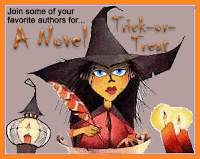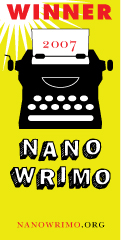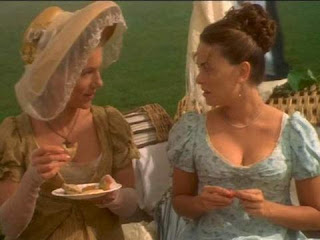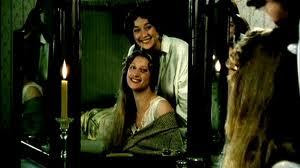 Today we are delighted to have Rose Lerner as our guest author. Rose burst onto the scene last year with her debut book, In For A Penny (Amanda listed this book as one of her 2010 favorites). Today Rose will talk about her second book, A Lily Among Thorns.
Today we are delighted to have Rose Lerner as our guest author. Rose burst onto the scene last year with her debut book, In For A Penny (Amanda listed this book as one of her 2010 favorites). Today Rose will talk about her second book, A Lily Among Thorns.
Praise for A Lily Among Thorns:
“I loved it, even more than I loved In For A Penny…most of all for a heroine who is independent, prickly, and wonderful all at the same time.” — Courtney Milan, author of Unveiled.

“Rose Lerner is masterful at bringing out the details that make characters human, in a way that reminds me of Judith Ivory and Meredith Duran. I highly recommend this novel and can’t wait for her next novel.” — Kat Latham,
Reader I created him.
Rose is giving away one signed copy of A Lily Among Thorns to one lucky commenter chosen at random.
A Big Risky Regencies welcome to Rose Lerner!
Tell us about A Lily Among Thorns.
My heroine Serena has been fighting for the past five years to build her hotel’s business and to be safe as a woman alone who’s known to have once worked as a courtesan. Then Solomon walks back into her life. She’s had a secret crush on him for years, ever since he gave her the money she needed to buy back her contract at a brothel, and walked away without touching her. But love, and the vulnerability it brings, terrifies Serena at the best of times–and these are definitely the worst of times. On the heels of Solomon’s arrival, she faces a close friend’s betrayal, the threat of losing her hotel, French spies, and a whole mess of other things that could bring her carefully constructed life crashing down around her ears.
What inspired this story?
Traditional Regencies, actually. There was a certain type of alpha hero who was very popular for a while: he never ever expressed his emotions. He barely had facial expressions. And sometimes, he had a deep, broad, and often unexplained knowledge of the criminal underworld. He was generally saved from his own self-hatred and isolation by the unconditional acceptance of an innocent but unconventional young woman. And I wanted to see what that would look like with the genders flipped.
The book grew from there, of course, but that was the seed.
What is risky about A Lily Among Thorns?
Three things. First, Serena is an embittered ex-courtesan. Remember that conversation last year about “unlikeable heroines”? (If not, my post on the subject is here, about how difficult it is as a woman to express anger and not feel guilty about it, and it’s got links to the original Dear Author post and another post at History Hoydens that I loved.)
Plus, Solomon, my hero, is a beta. He’s socially awkward, geeky, doesn’t have a ton of experience with women, and he works as a chemist for his uncle’s men’s tailoring shop. He’s got no problem standing up to Serena when it matters (and since she’s got some issues, that’s more often than you’d think), but he’s perfectly content to stand back and let her run the show in the general course of things.
The third thing is that the secondary romance is between two men, but I don’t want to say too much about that because there are some major spoilers involved.
Did you come across any interesting research when you were writing A Lily Among Thorns?
Oh, tons! I researched the London criminal world, gay clubs, annulments, chemistry, ethnic diversity in London, women’s property rights, who exactly is entitled to be beheaded instead of hanged, drawn, and quartered when convicted of treason, food and kitchens, the Battle of Waterloo…I could go on. If anyone has any questions about any of those things, I’d love to talk about them with you! Here’s two interesting things I discovered:
British people in the Regency did eat plenty of foreign-inspired food, especially French food. But it was much rarer than it would be a little later, or now, to refer to them by their foreign names. So when Solomon says he knows how to make crème brûlée, he calls it “burnt cream.”
And that story about Nathan Rothschild getting news of Waterloo in advance, tricking everyone at the ‘Change into thinking he knew Wellington lost, and then buying up all the consols and seizing control of England’s finances? Totally false. Also, when I was researching that, you would not believe how many scary anti-Semitic websites I found that used it as an example of how Jews control the world. Anyway, if you want to hear more, I’ve got a blog post about it here with lengthy quotes from a Rothschild biography.
I’ve also got a post on Regency chemistry up over at History Hoydens.
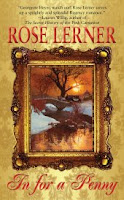 This is your second book, but we at Risky Regencies always love a debut author story. Your debut received some wonderful buzz. Tell us about your journey to publication?
This is your second book, but we at Risky Regencies always love a debut author story. Your debut received some wonderful buzz. Tell us about your journey to publication?
Thank you! I was actually having a really tough time with writing romance when I sold that book. I was having a tough time, period. When I was about a hundred pages into my first draft of In for a Penny, I found out my mom’s cancer was back and that she was going to die. I found out she would never get to read the book, and I didn’t write a word for about six months. My mom introduced me to romance novels and she was always the person I wrote for, the person I knew would love my books.
Eventually I forced myself to finish a draft but it was like pulling teeth, and once I was done, I couldn’t bring myself to edit it. I couldn’t even bring myself to reread it. I had a revised first three chapters, though. I promised myself I’d pitch it at the Emerald City Writers Conference, but if I didn’t get any requests for a full, I didn’t have to look at it ever again.
Well, Leah Hultenschmidt requested the partial, and I sent it to her, and I didn’t hear back. I figured, okay, that’s it then. I didn’t revise it, I didn’t send it out, and I didn’t start my next book, either. I thought maybe it was the end of the line for me and historical romance. Maybe the spark was gone. Heck, it wasn’t like anyone would ever want to publish me anyway.
Then about six months later, Leah requested the full. For a minute there, I was actually kind of mad. I still didn’t believe she was going to buy it, and now I had to go through this whole grueling process and it would all be for nothing, right? But when I read the book again, I kind of liked it. Yeah, it needed a lot of work, but I could fix it. So I dived in, cleaned it up, sent it off, even got my groove back enough to start a new book…and it turned out the spark wasn’t gone at all. I just needed to believe that someone might someday read what I was writing. I just needed to believe that someone might love it.
And then Leah called and said she wanted to buy In for a Penny, and the rest is history!
What is next for you?
I’m not sure. I’m almost done with a draft of a book about the 1812 Parliamentary general election. By the local rules of her town, the middle-class heroine’s husband would be eligible for a vote…if she were married. The younger-son-of-an-earl hero is sent to the town to find the heroine a husband, but of course he falls in love with her himself! But it’s not sold yet so I don’t actually know yet if it will be my next book out or when it will be available. I’ll keep you posted!
There’s plenty to comment about from this interview. Rose’s emotional debut story. The risks she took in this book. The research, especially about the Rothschilds. The whole issue of unlikeable heroines. So there’s no excuse not to leave a comment and earn a chance to win a copy of A Lily Among Thorns.
Or ask Rose a question! She’s coming back from a conference today, but will check in during the evening.


